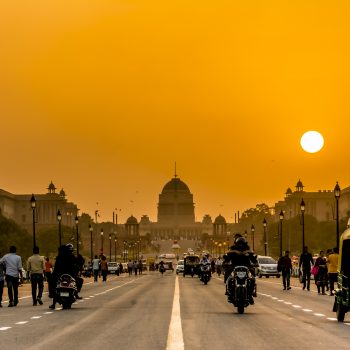Anyone for Brexit?...Why India and Commonwealth won’t be coming to the rescue.
It's a big IF, but if the United Kingdom manages to leave the European Union on 31 October, it will at least have managed to sign a clutch of Free Trade Agreements (“FTAs”) with some of the world’s economic leviathans: including the Faroe Islands, Liechtenstein and Chile. What? Not leviathans you say…well, what about our other FTA with the CARIFORUM Trade Block. The what? The CARIFORUM Trade Block…an economic collective of Barbados, Saint Lucia and the Dominican Republic, amongst others. So, if we’re ever in need of cod, false teeth, rum and molasses, things couldn’t be looking better.
But what if (that word again, “if” is now a Brexit institution), what if our ambitions run ahead of false teeth and towards some of the more substantial economies across the world?
After all, Liam Fox told us in 2017 that a Trade Deal with the European Union would be, don’t laugh, “the easiest in human history”; albeit earlier this year in an interview with the Financial Times he groaned his trade deals were getting harder to complete because nobody thinks the United Kingdom Government can handle Brexit. Who would have thought it? And Boris Johnson thought FTA negotiations would be a piece of cake (cake you can also eat). Although, on second thoughts isn’t this the same Boris Johnson who flew to Afghanistan to avoid having to vote on the third runway at Heathrow (having said he would lie in front of the bulldozers) and called Africans “flag waving piccaninnies with watermelon smiles”. Perhaps, it might be better after all if our prospective Prime Minister keeps his appointment in Southwark Crown Court rather than fly over to negotiate a Trade Deal with Ghana.
But what about India, the jewel in the crown of the former Empire: surely we can cut a Trade deal with India?
Don’t count on it.
The former Indian High Commissioner in London, Yashvardhan Sinha, dampened expectations on that front when he pointed out that the Fox Johnson axis of aspiration was nothing more than “pre-independence nostalgia” and who can blame him, given the United Kingdom is far from being amongst India’s front rank trading partners: exporting £3.7 Billion to India in goods and services last year in contrast to the £82 Billion exported by the European Union (the EU makes up 13% of India’s import trade).
Indeed, somewhat controversially, the High Commissioner may have put his finger on something more significant. Pre-Independence nostalgia weighs little against the hard economic fact that more than 44% of UK goods are exported to the EU, as opposed to 9% exported to the rest of the Commonwealth put together. And that progressive decline in the former mother country’s trade with its former colonies has been going on since 1950 with the strengthening of European economies in the aftermath of the second world war, a trend which has only been entrenched by the growth of the very EU’s Institutions Mr Fox and Mr Johnson seem to dislike. An added irony is that the trend was accelerated further by GATT, with its added Tarrifs for Commonwealth Countries: Tarrifs that are now overseen by the WTO (icon of the pro Brexit ERG Group).
And even with its far more significant (in contrast with the UK) trading platform, even the EU has had difficulties negotiating an FTA with India. Talks broke down in 2013 on the (hardly insignificant) issues of market access and tariff reductions, only to “resume” again last year to produce the EU – India Strategic Partnership, which did precisely nothing to address any of the issues that caused the talks to stall in the first place. So don’t hold your breath on that front either.
Bearing in mind that the UK has been part of the EU delegation negotiating with India, can it really hope in some schizophrenic leap of faith now to step into the gap left by its own failures?
India might think otherwise.
And in truth, the former Mother Country’s world has been turned upside down. India is now the fastest growing large economy on the planet with annual GDP growth of 7.3%, and is on track to have the largest, most avaricious consumer population in the world by 2022. The UK grew at less than 0.6% this year and has a population smaller than Thailand. Just where’s the soft power in that?
Brexit anyone?
Nobody understands the fundamentals of the Indian economy better than Red Ribbon Asset Management, which has placed the subcontinent at the heart of its investment strategies since the company was founded more than a decade ago. Drawing on an unrivalled knowledge of local markets with an expert team of more than a hundred advisers working in India’s economic hotspots, the Red Ribbon Indian Equities Fund offers unique opportunities to share in the potential of this, the fastest growing large economy on the planet.
[nectar_btn size="large" open_new_tab="true" button_style="regular" button_color_2="Accent-Color" icon_family="none" url="https://meetings.hubspot.com/ivan82" text="Request a call to find out more"]
Executive Overview
I’m always surprised to listen to leading UK Politicians advocating the apparent ease of completing a Free Trade Agreement in a matter of months, not least with major economic powers like India: more surprised still when they speak about the strong ties of Commonwealth putting the United Kingdom in some way at the head of the queue. I’m proud of the links between our two countries, but I don’t think they do anything of the kind and comments from former High Commissioner in London reinforce my reservations.
As the Article says, the world has come a long way since Independence, and I doubt that India will be coming to the United Kingdom’s economic rescue anytime soon if (and its a big “if” as the article also says) Brexit is brought to a conclusion. India is now one of the world’s economic superpowers and it would be as well to start recognising that fact.
I know our two countries will continue to trade together and thrive together, but they will do so in the real world; not a world unduly coloured by pre-independence nostalgia.







Leave a Reply